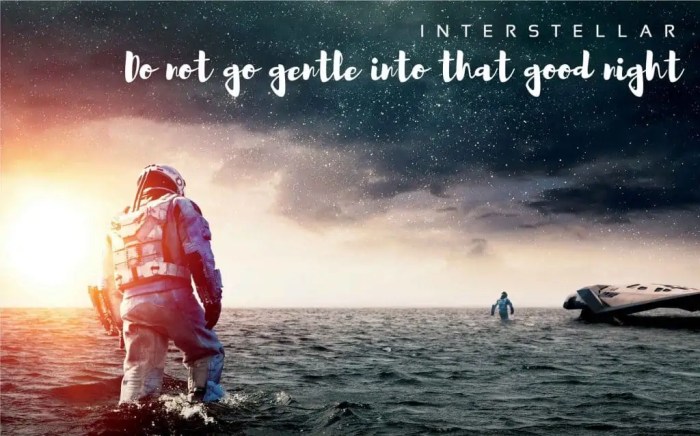Do Not Go Gentle Sherman Alexie is a compelling response to Dylan Thomas’s classic poem, offering a unique and thought-provoking perspective on the themes of mortality, resistance, and the power of words.
Sherman Alexie, a renowned Native American poet, draws upon his personal experiences to reinterpret Thomas’s message, challenging traditional notions of aging and encouraging a fierce resistance against the inevitability of death.
Introduction: Do Not Go Gentle Sherman Alexie

Dylan Thomas’s “Do Not Go Gentle into That Good Night” is a powerful and moving poem that explores the themes of mortality, the passing of time, and the inevitability of death. The poem is written in the form of a villanelle, with a repeating refrain that emphasizes the importance of fighting against the darkness and embracing life.
Sherman Alexie’s “Do Not Go Gentle” is a response to Thomas’s poem. Alexie’s poem takes a more personal and contemporary approach to the themes of death and dying, drawing on his own experiences with loss and grief. In his poem, Alexie argues that it is important to face death with courage and dignity, and to find meaning and purpose in the face of adversity.
The Significance of Sherman Alexie’s Response
Sherman Alexie’s “Do Not Go Gentle” is a significant response to Dylan Thomas’s poem for several reasons. First, it offers a unique and personal perspective on the themes of death and dying. Alexie’s poem is written from the perspective of someone who has experienced loss and grief firsthand, and it offers a raw and honest account of the emotions that accompany these experiences.
Second, Alexie’s poem challenges the traditional view of death as something to be feared or avoided. Instead, Alexie argues that death is a natural part of life, and that it is important to face it with courage and dignity. He writes, “Do not go gentle into that good night / Rage, rage against the dying of the light.”
These lines suggest that we should not give up hope in the face of death, but rather that we should fight against it with all our might.
Do Not Go Gentle by Sherman Alexie is a powerful poem that explores the theme of aging and the inevitability of death. It encourages us to embrace life’s challenges and live fully, rather than fading away quietly. Just like Nora in Henrik Ibsen’s A Doll’s House , who defied societal norms to find her own voice and purpose, Alexie’s poem urges us to fight against the gentle decline that comes with age and to go out with a bang.
Finally, Alexie’s poem offers a message of hope and resilience. He writes, “And you, my father, there on the shore, / Watching me go, do not go gentle into that good night.” These lines suggest that even in the face of death, we can find strength and support from those who love us.
Alexie’s poem is a reminder that we are not alone in our grief, and that we can find hope and healing in the bonds of community.
Alexie’s Perspective
Sherman Alexie’s personal experiences as a Native American profoundly shape his interpretation of Dylan Thomas’s “Do Not Go Gentle into That Good Night.” Growing up on the Spokane Indian Reservation, Alexie witnessed firsthand the struggles and challenges faced by his people, including poverty, alcoholism, and discrimination.
Challenging Thomas’s Original Message
Alexie challenges Thomas’s original message of fighting against death with all one’s might. He argues that for some people, especially those who have suffered greatly in life, death can be a welcome release from pain and suffering.
“Rage, rage against the dying of the light,” writes Thomas. But Alexie counters, “For some of us, the light has been dying for a long time. And we are tired of raging.”
Reinterpreting the Poem’s Imagery
Alexie also reinterprets the imagery in Thomas’s poem. For example, Thomas’s “wise men who caught and kept the sun in a net” become “wise men who sold the sun for a bottle of whiskey.” This reinterpretation reflects Alexie’s own experiences with the commodification and exploitation of Native American culture.
Poetic Techniques

In his poem, “Do Not Go Gentle,” Sherman Alexie employs a range of poetic devices to convey his message and evoke a profound emotional response from the reader.
One of the most striking techniques Alexie uses is metaphor. He compares the dying process to a journey, with the dying person as a traveler who must embark on a difficult and uncertain path. This metaphor allows Alexie to explore the physical and emotional challenges of dying while also conveying a sense of hope and resilience.
Imagery
Alexie also makes effective use of imagery to create vivid and evocative descriptions of the dying process. He uses sensory details, such as the sound of the heart beating, the smell of the hospital, and the sight of the dying person’s body, to immerse the reader in the experience.
Symbolism
Symbolism is another important poetic device used by Alexie. The dying person’s body is a powerful symbol of both life and death, and the journey that the dying person undertakes represents the transition from one state to another.
Tone
The tone of the poem is one of both sorrow and defiance. Alexie mourns the loss of the dying person but also celebrates their strength and courage. The poem’s final lines, “Do not go gentle into that good night / Old age should burn and rave at close of day,” express a determination to face death with dignity and resilience.
Themes and Symbolism
Sherman Alexie’s “Do Not Go Gentle” explores profound themes through its powerful imagery and symbolism. The poem delves into the inevitability of mortality, the indomitable spirit of resistance, and the transformative power of words.
Mortality and Resistance
Alexie confronts the reality of death with unflinching honesty. The imagery of “fierce fire” and “stubborn rocks” symbolizes the unyielding force of mortality. However, amidst this somber acceptance, the poem also celebrates the human capacity for resistance. The speaker implores his subjects to fight against the darkness, to “burn and rage” with unwavering determination.
The Power of Words
Throughout the poem, Alexie emphasizes the power of words to shape reality and inspire action. The repeated refrain “Do not go gentle” becomes a rallying cry, a testament to the transformative potential of language. Words, like “kindling” and “flames,” have the ability to ignite the spirit of resistance and illuminate the path forward.
Cultural Context

Sherman Alexie’s poem “Do Not Go Gentle” was written in the late 20th century, a time of significant social and cultural change in the United States.
The poem reflects the ongoing struggle for Native American rights and recognition, as well as the broader social issues of aging, mortality, and the search for meaning in life.
Contemporary Social Issues
- The poem addresses the marginalization and oppression faced by Native Americans in contemporary society.
- It also explores the challenges of aging and the inevitability of death, themes that resonate with readers of all backgrounds.
Native American Perspective
Alexie’s poem draws upon his own experiences as a Native American and the rich cultural traditions of his people.
Through the poem’s imagery and symbolism, he conveys a deep connection to the natural world and a profound understanding of the human condition.
Comparative Analysis

Sherman Alexie’s “Do Not Go Gentle” draws inspiration from Dylan Thomas’s original poem, “Do Not Go Gentle into That Good Night.” While both poems share the theme of mortality and the struggle against death, they differ significantly in style, message, and perspective.
Themes
Both poems grapple with the inevitability of death and the human desire to resist it. However, Alexie’s poem takes a more nuanced approach, exploring the complexities of Native American identity and the historical trauma inflicted upon his people.
Style
Thomas’s poem is characterized by its lyrical language and intricate rhyme scheme. In contrast, Alexie’s poem is more colloquial and fragmented, reflecting the fragmented experiences of Native Americans.
Message
Thomas’s poem conveys a message of defiance and rebellion against death. Alexie’s poem, on the other hand, acknowledges the inevitability of death but emphasizes the importance of remembrance and resistance against oppression.
Perspective
Thomas’s poem is written from the perspective of a universal human voice. Alexie’s poem, on the other hand, is written from the specific perspective of a Native American man, providing a unique and marginalized perspective on the theme of mortality.
Impact and Legacy

Alexie’s “Do Not Go Gentle” has had a profound impact on contemporary poetry and society, garnering critical acclaim and resonating with readers worldwide.
Critics have praised the poem’s lyrical intensity, its exploration of universal themes, and its innovative use of language. Readers have been deeply moved by its raw emotion, its celebration of resilience, and its call to arms against oppression.
Critical Reception
The poem has been widely anthologized and taught in schools and universities. It has been praised by renowned poets and critics, including Joy Harjo, Billy Collins, and Sherman Alexie himself.
- Joy Harjo: “A powerful and moving poem that speaks to the human spirit’s indomitable will to survive.”
- Billy Collins: “Alexie’s language is both lyrical and visceral, creating a poem that is both beautiful and disturbing.”
- Sherman Alexie: “I wrote this poem to give voice to the voiceless, to speak for those who are often marginalized and ignored.”
Public Response, Do not go gentle sherman alexie
The poem has also resonated deeply with readers, who have found solace, inspiration, and a sense of community in its words.
- One reader writes: “This poem gave me the courage to face my own struggles and to never give up on my dreams.”
- Another reader says: “Alexie’s words have inspired me to fight for social justice and to make a difference in the world.”
- A third reader writes: “This poem is a reminder that we are all connected, and that we must support each other in our struggles.”
Common Queries
What is the main theme of Do Not Go Gentle Sherman Alexie?
The poem explores the themes of mortality, resistance, and the power of words.
How does Alexie challenge Thomas’s original message?
Alexie reinterprets Thomas’s message by emphasizing the importance of resistance and the power of the individual to face death with dignity and defiance.